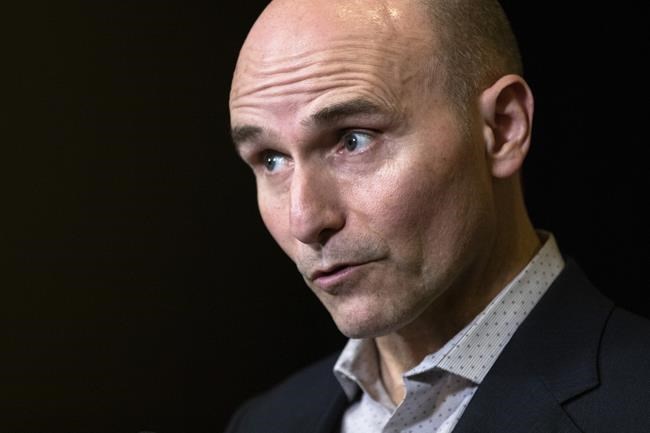
Federal Health Minister Jean-Yves Duclos speaks to the media at the Hamilton Convention Centre, in Hamilton, Ont., during the Liberal cabinet retreat, on Monday, Jan. 23, 2023. THE CANADIAN PRESS/Nick Iwanyshyn
Republished February 24, 2023 - 12:24 PM
Original Publication Date February 24, 2023 - 8:06 AM
HALIFAX - The executive director of Canada's drug pricing regulator is stepping down — just days after another member resigned because of concerns that the federal government was undermining the independent body's work.
Douglas Clark, with the Patented Medicine Prices Review Board, announced Friday he would be leaving his post after almost a decade with the regulator that oversees the prices of medicines sold in Canada.
His short statement, issued by the regulator's media relations office, did not state why he was leaving. The regulator "wishes to thank Mr. Clark for his years of dedicated service and leadership," the release said.
A day earlier, Matthew Herder, a professor of health law at Dalhousie University, announced he had resigned from the board, accusing the federal government of failing to implement critically important reforms that could lower the cost of medication.
"The government has fundamentally undermined the board's independence and credibility," Herder said in his resignation letter addressed to federal Health Minister Jean-Yves Duclos, dated Feb. 21.
Herder, who published his letter on social media, said he no longer believed it was possible to serve the public good in his role, which he had held since 2018.
Responding to news of Clark's resignation on Friday, Herder tweeted that the executive director’s departure is an "an immense, irreplaceable loss."
Herder, who is the director of Dalhousie’s health law institute at the Schulich School of Law, said in his resignation letter that on four separate occasions the federal government had delayed the implementation of new regulations that could decrease costs of drugs.
The regulations have been in the works since 2016, and they would allow the board to consider the market size, as well as the costs and benefits of certain drugs before it determines prices for Canadians. The proposed rules would also permit the board to change the list of countries it uses for price comparisons, among other things.
The pharmaceutical industry challenged the proposed regulations, and when Quebec's Court of Appeal ruled that some parts were unconstitutional, the federal government didn't seek leave to appeal to the Supreme Court of Canada.
"In choosing not to seek leave to appeal, the government effectively countenanced the evisceration of its own reform," Herder said.
Herder said the federal government has hindered progress on the file by failing to effectively defend the proposed rules in court and by putting off their implementation multiple times, “often at the 11th hour.”
He said that despite the board's gradual approach to implementation and communication of its plans with pharmaceutical companies, “the government accepted again and again industry’s claim that it needed more time to comply with the new regulations.”
"In the absence of the political courage to support meaningful policy reform, the position of the (regulator) has become untenable," Herder said.
He noted that the board’s original mandate given by Parliament was to protect consumers from excessive drug prices. Canada’s drugs are among the most expensive globally — third in the world behind the United States and Switzerland, he said.
“It is difficult enough for a sector-specific regulator to do its job in the face of a hostile industry. But when government adds its voice to that of industry, all that lies before the regulator is an endless tunnel with no light,” Herder said.
He also pointed out that the brand name pharmaceutical industry is failing to meet its long-standing pledge of spending 10 per cent of its sales on research and development in Canada. In 2021, the sector spent 3.4 per cent of its total sales on research and development — an all-time low.
Federal NDP health critic Don Davies is calling for the standing committee on health to investigate the concerns laid out in Herder’s letter. Friday he submitted a motion to the committee that would invite as witnesses Duclos, Herder, Clark and Mélanie Bourassa Forcier — the former acting chair of the board who resigned in December.
Davies called allegations of interference from government into the progress of the drug cost regulator “deeply concerning.”
“When Canadians can't afford to get the pharmaceuticals that they need, they get sicker and in some cases they may die,” he said in an interview Friday.
Clark has agreed to remain with the board as a special adviser for an unspecified amount of time, and the board said work to appoint his successor would be launched soon.
"People may come and go but the commitment of staff at the (regulator) to the very highest ideals of public service is unwavering and will endure," Clark said in a statement.
The Patented Medicine Prices Review Board declined to comment, and Health Canada did not immediately respond to questions.
This report by The Canadian Press was first published Feb. 24, 2023.
---
This story was produced with the financial assistance of the Meta and Canadian Press News Fellowship.
News from © The Canadian Press, 2023